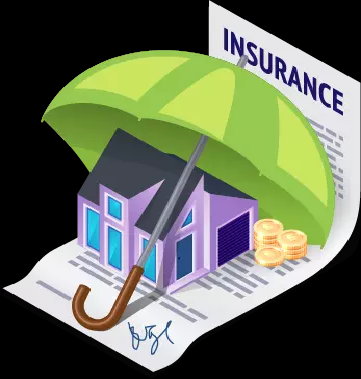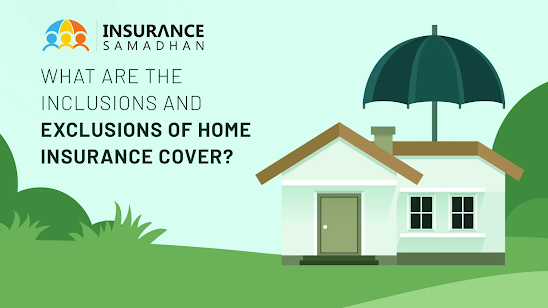Basics of Home Insurance, its Coverage, Importance, and Benefits
Introduction
Let's get this buddy started by asking you a question: what is your most valuable material asset? Our Own houses are the answer for the most equal of us. Our homes are not just a place for us to live, but they are also our most valuable asset, valued anywhere from a few lakhs to several crores.
Even still, the majority of homeowners do not insure their properties. Individuals frequently insure their automobiles (which is required) yet do not insure their homes. This is because the majority of individuals do not consider their homes to be at risk.
Homes across the country are in peril, despite popular belief. The number of fire accidents, thefts, and thefts reported each year ranges from thousands to lakhs. In addition, we have recently witnessed natural disasters claiming lives and property in several parts of India. There are numerous things that can go wrong with your house, including cataracts, hurricanes, and even earthquakes.
According to public records, almost 48 lakh Indians are affected by natural disasters on a regular basis, with property damage totaling over Rs. crores. Earthquakes have struck parts of North and West India, putting over 200 million people in danger across 100 cities.
This is where homeowners insurance comes in. Home insurance is a type of insurance that protects you from financial ruin if you lose your most valuable possession in a natural or man-made disaster. In addition, we cover everything you need to know about house insurance, including what it is, types, why you need it, how to choose the correct coverage, FAQs, and more.
What is the definition of home insurance?
A home insurance policy helps you protect the place where your heart is.
House insurance, property insurance, structure insurance, and homeowners insurance are some of the terms used to describe home insurance. This is a type of insurance policy that serves to protect your house against damage caused by covered occurrences (specified events) that are included in your policy document. Fire, cataracts, hurricanes, earthquakes, and other natural disasters are all regular insured events.
Still, if your property is damaged due to a disaster stated in the policy document, the insurance company will provide you with a lump-sum amount to cover the cost of repairing or rebuilding the damages in your home.
In addition, if a caller is hurt while visiting your home, your home insurance coverage will shield you from legal liability.
Coverage and Exclusions for Home Insurance
- Natural calamity Blasts, hail, fire, and lightning are examples.
- Screams, thievery, vandalism, or property destruction caused by civic unrest are all man-made issues.
- Construction of rail or road causes damage.
- Accidents involving planes or any other vehicle (not your own)bank or fire
Coverage provided by a homeowners insurance policy
Several types of damage are covered by a homeowner's insurance policy. Damaged power lines/cables, water channels, or structural damage are examples. It also provides a range for windows, doors, bottoms, and walls that have been broken. Not only does it cover the house, but it also covers the contents of the house. It can be broken down into four types of charges on the covered property, as shown below.
- Costs of interior damage
- Costs of exterior damage
- Loss or damage to certain items/means from a home
- Material injuries that may occur while on the damaged property are covered.
Exclusions
Despite the fact that home insurance covers both natural and man-made sources, numerous accidents occur. For example, there is no range for intentional damages, or damages caused by neglect, war, or "Acts of God." Count is one of them. A number of them are listed below.
- In a home insurance policy, 'Acts of God' cover disasters like as cataracts and earthquakes. Some suppliers may have redundant content or tailored programmes for these calamities in specific cases.
- Low or no conservation and neglect of the property cause damage.
- There is no coverage for damage caused by ants, rodents, cats, rot, or mould.
- Although some instances may have cover for fire and bank, it does not cover bank appearances from artificial or agrarian operations.
- If a family member does harm, whether intentionally or unintentionally. For example, a house insurance policy will not cover an accident involving one's own automobile.
- Any property destruction authorised by the Constitution or a court order
- Damage caused by nuclear weapons or a conflict in the country
What are the advantages of having a home insurance policy?
A home insurance coverage is required since it covers financial losses. You may also be responsible for property and goods damaged by an order that is not under your control. A home insurance policy's benefits are:
- You can receive plutocrat assistance for form and damage management as a result of unfortunate circumstances.
- Nonetheless, you can disclose insurance without causing a legal dispute.
- If a third-party agency has caused harm.
- If you have property insurance, getting a mortgage (home loan) for building, renovation, or expansion is simple.The costs of losing your belongings and being gratified can also be reimbursed. Appliances, furniture, cabinetry, widgets, and jewellery are examples of home goods.
- Damages caused by theft, thieving, or burglary are covered as well as damages caused by accidents or disasters.
- There are various types of home insurance plans that are designed to cater to specific needs. These schemes entail Landlord's or Tenant's insurance. When the renter (public liability) causes damage, the landlord might declare the landlord's insurance. Also, when there is a loss of occupant payment (rent) owing to unforeseen circumstances. In a take apartment, the tenant can also purchase insurance for his or her personal belongings.
How to File a Home Insurance Claim

Making a claim on your house insurance will cost you money. The amount of insurance you receive is determined by the type of policy you have. It is dependent on whether your coverage is based on the real cash value or the replacement value. It is further explained below:
The current worth of a house/house item is determined by its actual cash value. It subtracts the depreciation from the original cost of the item. Devaluation is the loss of value of an item/property as a result of its age and condition. The amount of depreciation varies depending on the secure item and the insurance provider.
Expect a television set to be insured and taken as a result of robbery. The insurance amount will be the cost of the television depending on its depreciation at the time of the claim.
The coverage's replacement value indicates it will pay for the full cost of the destroyed property or item. It will provide the replacement insurance amount.
Assume the damaged/lost television set is three years old and the coverage is based on its replacement cost. The insurance sum can then be claimed as the cost of the TV set at the time of purchase. The insurer will pay for the cost of purchasing/replacing the lost/damaged TV with a new one in similar condition.





No comments:
Post a Comment